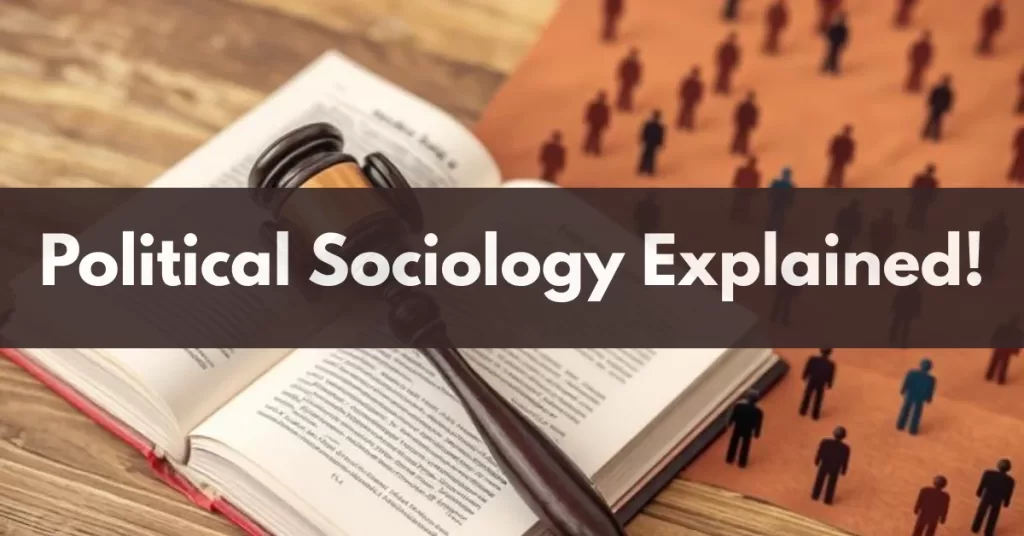Introduction
Have you ever wondered why some social groups have more power than others? Or why certain policies favor one section of society while others struggle? Whether we realize it or not, politics is deeply intertwined with our daily lives.
From the workplace to social media, power dynamics shape our experiences. This is where political sociology comes in—a fascinating field that helps us understand the intricate relationship between society and politics.
In this article, we will explore the definition of political sociology, the nature of political sociology, and the scope of political sociology to give you a comprehensive understanding of this subject.
Must Read- 10 Importance of Political Sociology
Definition of Political Sociology
Political sociology is the study of how society and politics interact. It examines power structures, political institutions, public behavior, and the influence of social factors on political outcomes.
Scholarly Definitions
- According to Seymour Martin Lipset, “Political sociology is the study of the relationship between political and social structures.”
- Max Weber defined it as “the study of power and authority in various forms of social organization.”
- Robert Dahl emphasized that political sociology examines “how individuals and groups influence political decision-making.”
From these definitions, we can understand that political sociology is not just about government structures but also about power relations within society.
Must Read- Power and Authority: The Structures of Governance
Nature of Political Sociology
The nature of political sociology can be understood through its interdisciplinary approach and key characteristics.
1. Interdisciplinary Nature
It draws from sociology, political science, history, economics, and psychology. It blends social theory with political analysis to give a holistic view of power and governance.
2. Focus on Power and Authority
Power is a central theme in political sociology. It explores how authority is distributed, who holds power, and how it affects different social groups.
3. Relationship Between State and Society
It examines how governments function and how societies influence political systems and studies elections, political parties, and civic movements.
4. Influence of Social Structures
Social class, caste, gender, race, and religion play a crucial role in politics. It investigates how these factors shape governance and policy-making.
5. Empirical and Theoretical Approach
It combines theories with real-world data. Researchers analyze case studies, historical events, and current political trends to derive conclusions.
Must Read- Political Socialization: What Shapes Your Political Views?
Scope of Political Sociology
The scope of political sociology is broad, covering various aspects of politics and society. Here are some key areas it focuses on:
1. Political Institutions and Structures
It studies how governments, parliaments, bureaucracies, and legal systems function. It analyzes their role in shaping policies and maintaining social order.
2. Political Behavior and Participation
Why do people vote? How do protests emerge? It examines political participation, voter behavior, and mass movements to understand public engagement.
3. Social Movements and Revolution
From civil rights movements to feminist struggles, political sociology investigates how social groups challenge power structures and bring about change.
4. Influence of Ideology
Political ideologies such as liberalism, socialism, and nationalism influence governance. Political sociology studies how these ideologies shape public opinion and policy-making.
5. Power and Class Struggle
Karl Marx emphasized the role of class struggle in politics. It examines how economic disparities and power imbalances impact governance.
6. Globalization and Politics
With the rise of globalization, politics is no longer confined to national boundaries. It explores international relations, global governance, and transnational movements.
7. Role of Media in Politics
In the digital age, media plays a crucial role in shaping political opinions. It studies how news, social media, and propaganda influence public perception.
Must Read- Political Culture: Meaning, Features, Types, and 10 importance
Why Political Sociology Matters Today
Understanding political sociology is crucial in today’s world. With increasing political polarization, social inequality, and rapid technological advancements, this field helps us critically analyze current events. It equips individuals with the knowledge to engage in informed discussions, challenge injustices, and participate actively in democracy.
For students, researchers, and political enthusiasts, political sociology offers valuable insights into the functioning of society and governance. It helps in careers related to public administration, policymaking, journalism, activism, and academia.
Conclusion
In summary, political sociology is the study of power, governance, and social structures. It helps us understand why certain policies benefit some groups while others suffer. By exploring the definition of political sociology, nature of political sociology, and scope of political sociology, we gain a deeper understanding of political processes and their impact on society.
As a student of politics, engaging with political sociology will sharpen your analytical skills and broaden your perspective on governance. Whether you aspire to work in government, academia, or civil society, this field will equip you with the tools to navigate the complexities of politics and society.
So next time you see a political debate, a social movement, or a policy change, remember—it’s not just politics; it’s political sociology in action!
References
- Lipset, S. M. (1981). Political Man: The Social Bases of Politics. Johns Hopkins University Press.
- Weber, M. (1947). The Theory of Social and Economic Organization. Free Press.
- Dahl, R. A. (1961). Who Governs? Democracy and Power in an American City. Yale University Press.
- Giddens, A. (1991). The Consequences of Modernity. Stanford University Press.
- Marx, K. (1867). Capital: Critique of Political Economy. Penguin Classics.
FAQs
1. What is the definition of political sociology?
Political sociology is the study of the relationship between society and politics, focusing on power structures, governance, and public behavior.
2. What are the main areas covered in the scope of political sociology?
The scope includes political institutions, behavior, social movements, ideology, class struggle, globalization, and media influence in politics.
3. Why is political sociology important?
It helps us understand power dynamics, social inequalities, and governance structures, making us more informed citizens.
4. How does political sociology differ from political science?
While political science focuses mainly on government systems and policies, it examines the broader social influences on politics.
5. Can political sociology help in policymaking?
Yes, it provides insights into social behavior and power relations, which are crucial for designing effective policies and governance structures.

